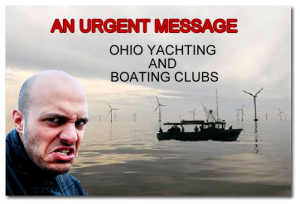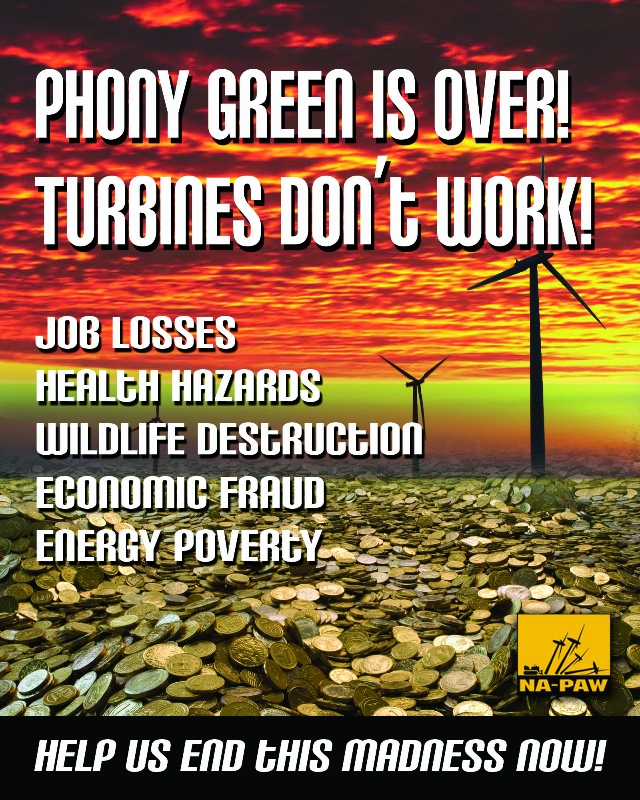By Michel Chevalier, REM – Real Estate Magazine
To be green, or not to be green? That is the question! The answer my friends, is not blowing in the wind, as many residents of rural Canada and elsewhere around the world are finding out – the hard way – by living next to giant industrial wind turbines (400 to 500 feet tall and growing).
How does this relate to ‘tax’ you ask? Well, it’s a little off the topic of some of my previous columns that relate to individual tax matters, but I can say it impacts us all in that our governments are spending hundreds of millions of our tax dollars funding mostly multinational corporations in the construction of industrial wind farms. The huge cost associated with wind farm development is a major reason for the projected huge increases in electricity costs in my home province of Ontario.
I live in rural Amaranth Township just north of Orangeville, Ont. In this township we already have 20 or 30 industrial wind turbines scattered on farms in the northern portion of the township and many more just across the town line in Melancthon. We have direct knowledge of and contact with people who have been driven from their homes; who suffer from some of the extremely debilitating health effects caused by audible, inaudible and low frequency noise; and from the strobe-like effects of sunlight flicker from the blades. There are people who can’t sell their homes and are forced to rent other living accommodation; and people who sell their homes to the wind energy companies at much reduced prices and then are ‘gagged’ from talking about any of the negative health effects.
Most of us used to think that green is good, and that wind energy is renewable and green so it’s good, without doing any research and with limited knowledge. Last fall we were made aware of a proposed project planned almost next door to us. One of the turbines, if erected, will be less than a kilometre away. This is legal, as the minimum setback in Ontario has been legislated to 550 m. Legal does not make it right and it does not make it healthy; and yes we are NIMBYs but, as we learned, with far more reason than simple esthetics.
What we discovered, along with our friends and neighbours, was absolutely shocking to all of us. In spite of several years of mounting evidence pointing to serious problems with industrial wind energy installations in terms of health, property values, water quality, wildlife, and agricultural land degradation, the Government of Ontario continues to pursue, at breakneck speed, the approval and development of these projects – to the huge detriment of many of its rural citizens.
While Ontario is not alone, it is the most aggressive jurisdiction. Similar situations have arisen in New Brunswick, Nova Scotia, Quebec and Alberta as well as all over the U.S. and in other countries. The countries that have the most experience with industrial wind power generation are finally starting to pull back and re-evaluate. Denmark now only allows new wind turbine installations in the ocean. France is reversing course by drastically cutting funding to wind energy companies, as is Spain and one of the provincial governments in Australia; and there are indications that Japan will be slowing down and re-evaluating as well. We’re not there yet in Ontario and the other provinces. Some of our politicians have painted themselves into a ‘green’ corner that ain’t so green.
I’m writing this column to inform real estate agents across Canada and if needed to provide information, contacts and resources. Agents and brokers whose business lies mainly in towns and cities are most likely generally in favour of wind energy, as were most of us and most people initially. Everyone needs to be better informed about this subject. It is becoming extremely political in many jurisdictions as a strong groundswell of opposition continues to grow and it would be a shame to have an uninformed rural/urban split on the issue.
Wind energy per se is not bad. Forging ahead and consciously ignoring mounting negative evidence is seriously irresponsible. As a society we need to direct our governments to take a “precautionary” pause to re-evaluate how industrial wind energy can best fit into energy policy in terms of where wind farms are sited and how much of a contribution and at what cost wind will make to overall energy generation.
Here are links to websites that provide a tremendous amount of information about industrial wind energy and will serve to open the window on what is happening in Canada, the U.S. and around the world. I encourage you and/or your clients to make use of the contacts and resources. I am happy to exchange experiences and information and/or to dialogue on the comments section below.
Wind Concerns Ontario (http://windconcernsontario.wordpress.com) is a coalition of some 54 local community action groups that have come together to exchange information and help each other in the push to call a moratorium on further development until further studies have been completed and guidelines established.
The Society for Wind Vigilance (http://windvigilance.com/page002.aspx) is an international federation of physicians, engineers and other professionals that promotes the development of safe and authoritative industrial wind turbine guidelines.
WCORHE (www.wcorhe.org/) is the local group I am with and is an example of a small community group coming together.
There are two extremely important legal challenges soon to be heard in Ontario. The Ian Hanna case will be heard from January 24 – 26, and the Kent-Breeze Appeal from February 1 for at least seven days. You will find links and information about both at Wind Concerns Ontario.
Michel Chevalier, a newly minted wind activist, has many years of business experience combining over 20 years managing multiple trade associations representing several dozen industries, building his own small business from the ground up and more recently as a consultant specializing in helping individuals and small business significantly reduce taxes by implementing legal business strategies. He also represents clients in audit and other difficult situations with Canada Revenue Agency (CRA). Email: michel@mcchevalier.com





